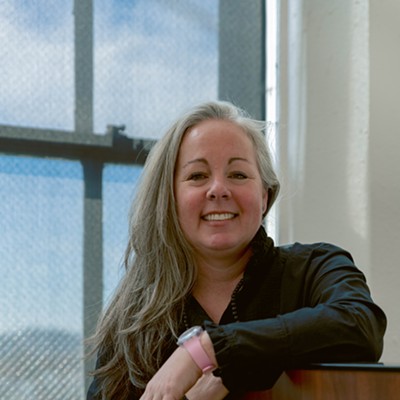Two little mice fell in a bucket of cream ... but was it local cream? And did the cows eat organic grass? And who owns the dairy? Tell us, mice. People have questions about their food these days.
Recently I spotted a Texas butter called Falfurrias at the grocery store. The yellow package proclaims that it's "A Texas Tradition Since 1909" with a large GoTexan label. The back of the box tells a story of the Falfurrias Creamery that began in 1909 in the town of Falfurrias, in far South Texas.
My Texas heart did a two-step. I love all things Texas, especially supporting small family-run operations. I thought, "I will buy this butter, and we will make happy cookies."
A little more research on the Texas State Historical Association website reveals that Edward C. Lasater started a cattle ranch in the small town in 1895, which eventually became one of the largest ranches in the state. Lasater bought some Jersey cows and started producing butter, which became known across the state for its great quality.
But all those romantic dreams were whisked away after a little further research revealed that the Dairy Farmers of America, which has a huge plant in Winnsboro, now owns the family-owned butter company.
I felt like I had been bamboozled. Upon further inspection, the wording on the box is careful, never alluding to the fact that it is still a family-owned creamery, only that it's been a "Texas tradition since 1909." The historical account of the farm is told as "how it all began," not how it is now. And since we have cows aplenty and the plant is in Texas, well, it qualifies for the GoTexan label.
I wondered how the Lasater family felt about this.
I called the city of Falfurrrias where some employee gave me a long "uh-huh" when I mentioned the butter. That sent me to the town newspaper. After a two-minute friendly conversation, I had the phone number for the grandson of the original owner, also Ed Lasater.
And, well, I now have a crush on Falfurrias butter. Mr. Lasater told me about the old days on his grandfather's ranch.
"I was raised on the ranch and went to school down there," said Lasater, who now lives in the Houston area. "I delivered many a pound of butter to the local stores in those days."
But butter has had a hard time over the past century.
"During the 1920s we had distribution all the way to the East Coast. But after the Second World War, we solidified to just Texas," Lasater said. "The butter business has always been a tough game. Later on, in the '90s people started eating differently and getting concerned about high cholesterol and diets. It sort of damped the prospects for butter."
About that time, in the early '90s, a local dairy company that had been trying to buy the dairy business from the Lasater family asked again if they would sell. Garland Lasater, the original founder's son, had some stipulations about the quality of the butter and machinery used to package it. They eventually worked it out and the family got out of the butter business.
Since then the label has been sold a few times, but still remains in Texas.
Lasater is still proud to see his family's brand of butter at his local Kroger. "It gained a great reputation and garnered a lot of loyalty. The business just isn't as robust as it used to be."
So, labels can mean a lot of things. They can carefully imply things that aren't true. They can tell stories that are certainly factual, but not really relevant to the final product. But sometimes nostalgia wins.











